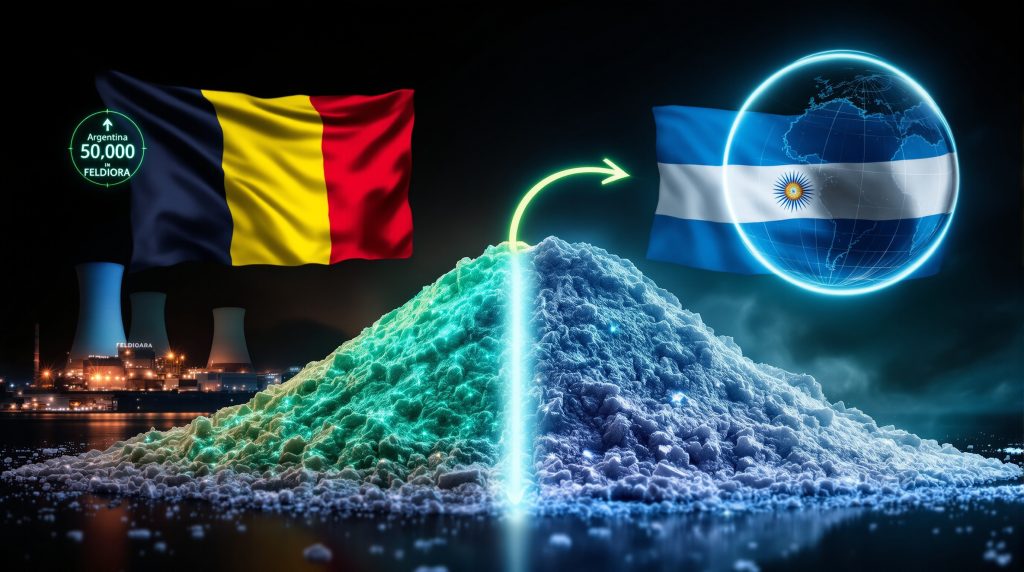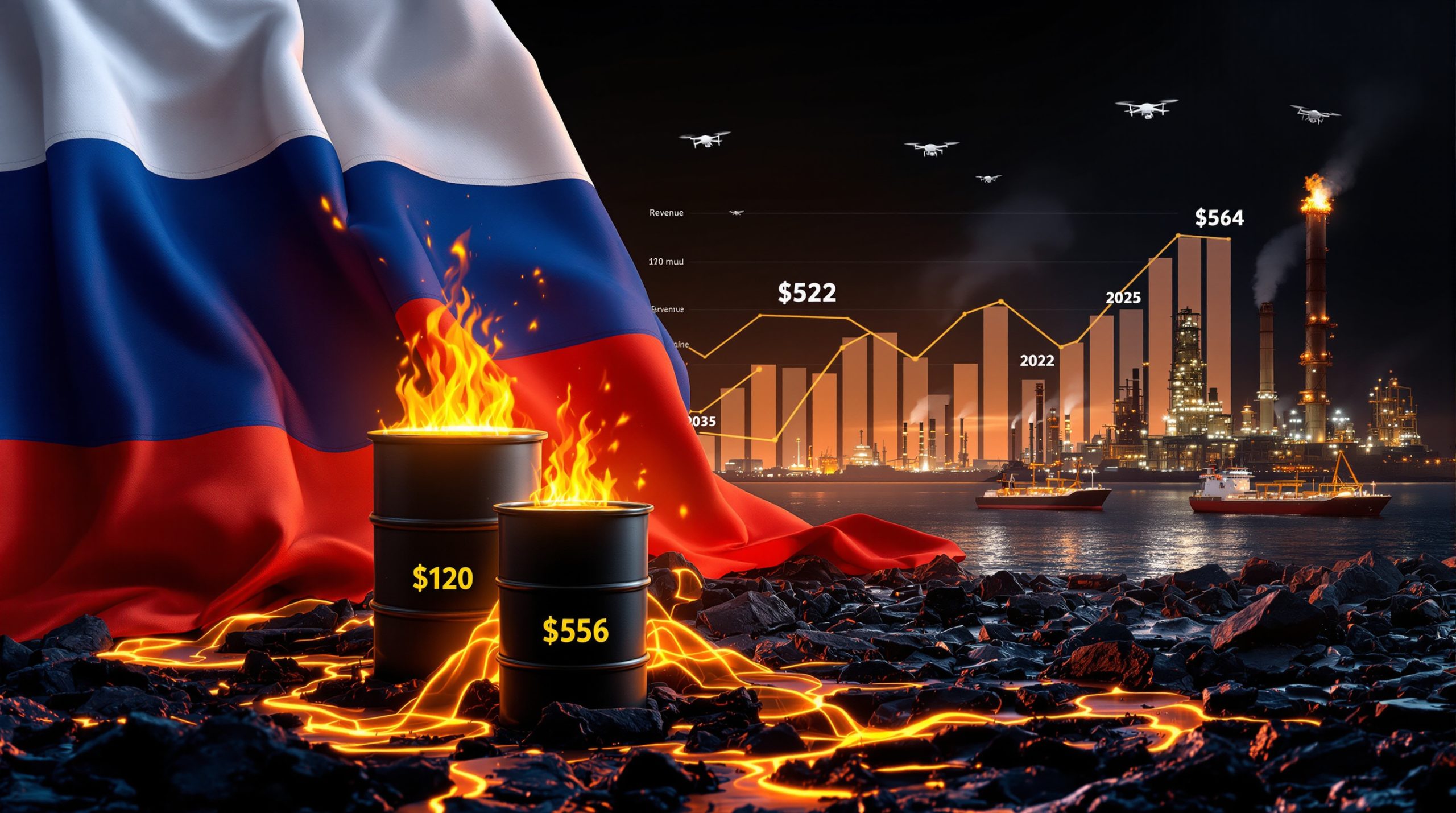What Makes Romania's First International Uranium Export Significant?
Romania has achieved a historic milestone in its nuclear sector with the Feldioara Uranium Concentrate Processing Plant securing its first international uranium dioxide export contract. This breakthrough agreement with Argentina represents a significant advancement for Romania's nuclear industry and marks its emergence as a global supplier of nuclear fuel materials.
The Breakthrough Achievement for Romania's Nuclear Sector
The export deal represents the culmination of a strategic transformation that began in December 2022 when Nuclearelectrica, Romania's nuclear power corporation, acquired the uranium processing assets at Feldioara. The facility was successfully operationalized in 2023, and within approximately two years, it achieved export capability status—an impressive timeline from acquisition to international delivery.
According to World Nuclear News, Cosmin Ghita, General Manager of Nuclearelectrica, stated this achievement represents "a source of pride and achievement for Nuclearelectrica and its subsidiary, FPCU Feldioara, but also for the development of the Romanian fuel cycle," highlighting the significance of this accomplishment within Romania's broader nuclear strategy.
The contract scope is substantial, providing sufficient uranium dioxide to cover Argentina's nuclear power plants' needs for an entire year, demonstrating immediate confidence in Romania's production capabilities and quality standards.
Strategic Implications for Global Nuclear Fuel Supply Chains
This export agreement contributes to the diversification of global nuclear fuel supply chains at a critical time when energy security concerns are paramount worldwide. By establishing itself as an international supplier of nuclear fuel materials, Romania enhances supply chain resilience in an industry where consistent, reliable access to fuel is critical for power plant operations.
The deal represents a new node in global nuclear fuel networks, reducing concentration risks that can arise when too few suppliers dominate the market. Such diversification is increasingly valued in the nuclear sector where fuel security directly impacts energy security for nations with nuclear power programs.
For the European nuclear industry specifically, Romania's export capability strengthens the continent's position in nuclear fuel markets, traditionally dominated by a limited number of major international suppliers. This development comes at a time when Europe is reassessing its energy security frameworks amid uranium market volatility.
How the Deal Strengthens Nuclear Cooperation Between Continents
The Romania-Argentina agreement builds upon technical compatibility between the two nations' nuclear programs. Both countries operate pressurized heavy water reactors (PHWRs), including CANDU technology, creating natural synergies for fuel supply partnerships.
Argentina operates three nuclear power reactors with a combined capacity of approximately 1,700 MWe, including the Embalse CANDU reactor (648 MWe), alongside two domestically designed PHWRs at Atucha (362 MWe and 692 MWe respectively). This technological alignment has facilitated the establishment of this transcontinental nuclear cooperation.
The partnership potentially opens doors for further collaboration between European and South American nuclear sectors, which historically have had limited interconnection compared to other regional nuclear networks. Beyond the immediate commercial benefits, this relationship could foster knowledge exchange and technical cooperation between the nuclear programs of both nations.
How Did Romania Transform Its Nuclear Fuel Capabilities?
Romania's journey to becoming an international nuclear fuel supplier involved strategic acquisition, technical modernization, and operational transformation of key facilities—all within a compressed timeframe.
Nuclearelectrica's Strategic Acquisition of Feldioara Processing Plant
The transformation began in 2021 when Romania's competition commission cleared Nuclearelectrica's purchase of uranium processing line assets from Compania Nationala a Uraniului (CNU) at Feldioara. This state company had previously managed Romania's uranium resources, historically mining uranium at Crucea-Botusana and refining it at Feldioara.
The acquisition was completed in December 2022, transferring ownership of critical nuclear fuel cycle infrastructure to Nuclearelectrica. According to World Nuclear News, Nuclearelectrica stated that its objective was to "preserve and develop the integrated Romanian nuclear fuel cycle, the integrated production capacities […] ensuring the production of fuel assemblies and the optimal operation of FCN Pitești and CNE Cernavodă, at an advantageous transaction cost."
This transfer of assets represented a strategic pivot in Romania's nuclear sector management, centralizing control of fuel production under the same entity that operates the country's nuclear power plants.
The Rapid Modernization Timeline: From Takeover to International Supplier
Following the acquisition, Nuclearelectrica implemented an accelerated modernization and operationalization plan:
- December 2022: Acquisition completed
- 2023: Facility operationalized under new management
- 2023-2025: Ongoing modernization and quality enhancement programs
- October 2025: First international export contract secured
This rapid transformation from domestic supplier to international exporter in approximately two years demonstrates remarkable operational efficiency and strategic execution. The modernization efforts focused on ensuring the facility could meet stringent international quality standards while maintaining sufficient capacity for both domestic and export markets.
The transition was particularly challenging because Romania ceased uranium mining operations at Crucea in 2021. This required adapting the Feldioara facility to process imported uranium concentrate rather than domestically mined material—a significant operational adjustment similar to challenges faced in regions with a uranium mining halt.
Key Technological Upgrades That Enabled Export-Quality Production
While specific details of the technological upgrades at Feldioara haven't been publicly disclosed, the facility underwent significant modernization to meet international standards for uranium dioxide production. These improvements likely included:
- Enhanced quality control systems to ensure consistent product specifications
- Process automation to improve efficiency and reduce variability
- Updated safety and environmental protection measures
- Modifications to accommodate different uranium concentrate sources
- Implementation of international nuclear material handling protocols
Cosmin Ghita confirmed the success of these modernization efforts, noting that the export agreement "is a confirmation of the quality of the raw material processed at Feldioara."
The technological compatibility between Romania's CANDU reactor fuel requirements and Argentina's needs, particularly for its Embalse CANDU reactor, facilitated the transition to export-quality production, as both require similar uranium dioxide specifications.
Why Is Argentina Sourcing Nuclear Fuel from Romania?
Argentina's decision to source nuclear fuel from Romania's Feldioara facility represents a strategic alignment between two nations with compatible nuclear technologies and mutual interests in supply chain diversification.
Argentina's Nuclear Power Infrastructure and Fuel Requirements
Argentina maintains a substantial nuclear power program with three operational nuclear power reactors:
- Atucha I: 362 MWe PHWR, operational since 1974
- Atucha II: 692 MWe PHWR, commissioned in 2014
- Embalse: 648 MWe CANDU reactor
These reactors are operated by Nucleoeléctrica Argentina SA (NASA), a state-owned company responsible for managing the country's nuclear power infrastructure. Combined, these plants generate approximately 1,700 MWe of electricity, requiring a consistent supply of nuclear fuel to maintain operations.
Argentina has historically maintained a strong commitment to nuclear energy independence, developing domestic capabilities across the nuclear fuel cycle since the 1960s. However, diversifying supply sources provides important operational flexibility and energy security benefits, particularly for critical components like nuclear fuel.
The CANDU Connection: Technology Compatibility Between Nations
The technological compatibility between Romania's and Argentina's nuclear programs creates natural synergies for fuel supply partnerships. Both countries operate pressurized heavy water reactors (PHWRs), with Argentina's Embalse plant specifically utilizing CANDU technology similar to Romania's Cernavoda facility.
CANDU reactors utilize natural uranium dioxide fuel (not enriched), which simplifies the supply requirements compared to light water reactors that need enriched uranium. This technical alignment means that the uranium dioxide produced at Romania's Feldioara facility can meet the specifications required by Argentina's reactors without requiring significant modifications or adaptations.
This compatibility streamlines the qualification process for new suppliers, as the technical specifications, quality requirements, and performance parameters are largely consistent between the two countries' fuel needs.
Supply Security Benefits for Argentina's Three Operating Reactors
For Argentina, diversifying uranium dioxide suppliers enhances energy security by:
- Reducing reliance on any single source of nuclear fuel materials
- Creating competitive market dynamics among potential suppliers
- Mitigating supply chain disruption risks
- Establishing relationships with multiple qualified suppliers
- Leveraging global market opportunities for potentially advantageous pricing
The contract volume—sufficient to cover Argentina's nuclear power plants' needs for one full year—indicates a significant commitment to this new supply relationship. This substantial volume suggests confidence in Romania's production quality and reliability, while providing Argentina with meaningful supply diversification.
In the context of global supply chain uncertainties and increasing focus on energy security, establishing multiple reliable sources for critical nuclear fuel materials represents prudent strategic planning by Argentina's nuclear authorities, especially given recent US uranium disruptions in the global market.
Inside Romania's Integrated Nuclear Fuel Cycle
Romania has developed a comprehensive nuclear fuel cycle that integrates multiple specialized facilities working in coordination to support its nuclear energy program. This integrated approach provides strategic advantages for both domestic operations and international export capabilities.
From Uranium Processing to Fuel Assembly Production
Romania's nuclear fuel cycle encompasses three primary facilities working in sequence:
- FPCU Feldioara: Processes uranium concentrate into uranium dioxide (UO₂)
- FCN Pitești: Manufactures fuel assemblies using uranium dioxide
- CNE Cernavodă: Utilizes the fuel assemblies in its CANDU reactors
This production chain begins with uranium concentrate (yellowcake) being processed at Feldioara into uranium dioxide powder with the specific properties required for CANDU fuel production. The uranium dioxide is then transferred to the Pitești facility where it is manufactured into fuel bundles designed specifically for CANDU reactors.
Prior to 2021, Romania maintained a fully domestic fuel cycle, with uranium mined at Crucea-Botusana, processed at Feldioara, and manufactured into fuel assemblies at Pitești. However, following the cessation of domestic mining in 2021, Romania now imports uranium concentrate for processing at Feldioara.
The Strategic Role of Feldioara in Romania's Energy Independence
Feldioara represents a critical link in Romania's nuclear fuel supply chain, enabling the country to maintain control over key aspects of fuel production despite no longer mining uranium domestically. By preserving and modernizing this processing capability, Romania retains significant energy independence benefits:
- Control over fuel quality specifications
- Reduced dependence on foreign suppliers for processed nuclear materials
- Maintenance of technical expertise in nuclear fuel processing
- Ability to adapt to different uranium concentrate sources
- Industrial security for critical energy infrastructure
According to Gelu Agafiel Maracineanu, General Manager of FPCU Feldioara, the facility's primary mission remains "supplying the raw material needed to manufacture fuel assemblies at Pitesti for units 1 and 2 at Cernavoda Nuclear Power plant." This domestic supply security remains the foundation upon which export capabilities have been developed.
The facility's strategic importance was recognized in Nuclearelectrica's acquisition rationale, which emphasized preserving Romania's integrated nuclear fuel cycle as a priority objective.
How Domestic Capabilities Support International Export Ambitions
Romania's established domestic nuclear fuel infrastructure provided the foundation for its international export capabilities. Several factors enabled this expansion:
- Technical expertise developed through decades of domestic fuel production
- Quality control systems refined through supplying Romania's own reactors
- Scale efficiencies that allow production beyond domestic requirements
- Modernization investments that enhanced both capacity and quality
- Integration with Nuclearelectrica's broader nuclear management systems
Maracineanu explained that beyond domestic supply, "we have set out to develop, expand our supply network and offer the nuclear fuel cycle in Romania a new dimension: the international one." This evolution from domestic supplier to international exporter represents a natural progression leveraging Romania's established capabilities.
The Argentina contract demonstrates how Romania has successfully built upon its domestic nuclear fuel infrastructure to create new international opportunities, generating additional value from existing capabilities and investments in a manner similar to advancements in US uranium production.
What Technical Specifications Make This Export Possible?
The successful export of uranium dioxide from Romania's Feldioara facility to Argentina is enabled by specific technical capabilities, quality standards, and compatibility with CANDU reactor requirements.
The Uranium Dioxide Production Process at Feldioara
The Feldioara facility specializes in converting uranium concentrate (yellowcake) into uranium dioxide powder suitable for fuel assembly manufacturing. While specific process details are proprietary, the general conversion process involves:
- Purification of uranium concentrate to remove impurities
- Chemical conversion to create uranium dioxide powder
- Control of particle size distribution to ensure proper properties
- Quality testing to verify material specifications
- Packaging according to international nuclear material transport requirements
For CANDU reactors, the uranium dioxide must meet exacting specifications. These reactors use natural uranium (not enriched), which contains approximately 0.7% uranium-235, the fissionable isotope. This differs significantly from light water reactors that require enriched uranium with higher U-235 concentrations.
The particle characteristics of the uranium dioxide powder—including size distribution, surface area, and flowability—are critical parameters that affect the subsequent fuel manufacturing process and ultimately the performance of the fuel in the reactor.
Quality Control Standards for International Nuclear Material Exports
Exporting nuclear materials requires meeting stringent quality control and regulatory standards. While specific certifications held by Feldioara are not detailed in public sources, international nuclear material exports typically require:
- Compliance with IAEA safeguards agreements
- Adherence to international quality standards (ISO 9001 and nuclear-specific standards)
- Material composition verification through comprehensive testing
- Documentation of production processes and quality assurance procedures
- Independent verification of material properties
- Traceability throughout the production process
Nuclearelectrica's leadership specifically highlighted quality confirmation as a key factor enabling the export agreement, noting that the contract "is a confirmation of the quality of the raw material processed at Feldioara."
The ability to consistently meet these stringent quality requirements was likely a decisive factor in Romania securing the export contract through an international tender process.
Transportation and Safety Protocols for Nuclear Material Shipments
Transporting nuclear materials internationally involves complex safety and security requirements governed by international regulations. While the specific transportation arrangements for the Romania-Argentina shipments haven't been publicly detailed, such shipments typically require:
- Specialized packaging designed to IAEA Transport Regulations standards
- Physical security measures throughout the transportation chain
- Tracking and monitoring systems for material accountability
- Emergency response protocols
- International permits and notifications
- Compliance with nuclear non-proliferation commitments
These technical and regulatory requirements create significant barriers to entry for new suppliers in the international nuclear fuel market. Romania's ability to meet these complex specifications demonstrates the sophisticated capabilities developed at Feldioara under Nuclearelectrica's management.
The compatibility between Romania's CANDU fuel specifications and Argentina's requirements, particularly for its Embalse CANDU reactor, creates a natural technical alignment that simplifies qualification processes and reduces adaptation needs.
How Does This Deal Impact Romania's Economic Position?
Romania's breakthrough uranium export agreement creates significant economic benefits beyond the immediate contract value, positioning the country strategically in the global nuclear fuel market.
Revenue Diversification Beyond Domestic Nuclear Operations
The export agreement establishes a new revenue stream for Romania's nuclear sector, which had previously been limited to domestic electricity sales from the Cernavoda plant. This diversification brings several economic advantages:
- Creation of hard currency export revenue
- Reduced financial dependence on domestic electricity market conditions
- Development of a more balanced revenue portfolio
- Potential for margin expansion through international sales
- Mitigation of financial risks through market diversification
Nuclearelectrica has stated that international delivery of uranium dioxide through FPCU Feldioara "will add value and financial benefits" to the company, confirming the positive economic impact expected from export operations.
While specific contract values haven't been disclosed, the agreement covers Argentina's nuclear power plants' needs for one full year—representing a substantial volume of material and significant commercial value.
Value-Added Processing Economics in the Nuclear Supply Chain
By exporting processed uranium dioxide rather than raw uranium concentrate, Romania captures more value in the nuclear fuel supply chain. This value-added processing creates several economic benefits:
- Higher margins compared to raw material exports
- Employment of skilled technical workers
- Utilization of capital-intensive processing infrastructure
- Development of specialized technical expertise
- Creation of higher-value exports
This positioning in the higher-value segments of the nuclear fuel supply chain aligns with broader economic development goals of moving beyond raw material exports to more sophisticated manufacturing and processing activities.
The export of processed uranium dioxide rather than raw uranium represents a significant upgrade in Romania's position in global nuclear material value chains.
Employment and Expertise Development in Romania's Nuclear Sector
The Feldioara facility's expanded role supports high-skilled employment in Romania's nuclear sector while developing specialized expertise with international applications:
- Preservation of nuclear chemistry and processing skills
- Creation of quality control and regulatory compliance positions
- Development of international trade capabilities within the nuclear sector
- Maintenance of technical knowledge that supports Romania's broader nuclear program
- Opportunities for workforce development in specialized nuclear material handling
While specific employment figures for the Feldioara facility aren't publicly available, nuclear fuel processing facilities typically employ highly specialized technical staff with expertise in chemistry, nuclear materials, quality assurance, and regulatory compliance.
The international export capability also creates opportunities for Romanian nuclear professionals to engage with the global nuclear community, facilitating knowledge exchange and professional development through international nuclear cooperation networks.
What Challenges Did Romania Overcome to Reach Export Capability?
Romania's journey to becoming an international uranium dioxide exporter required overcoming significant technical, operational, and regulatory challenges in a compressed timeframe.
Transitioning from State Mining to Commercial Processing Operations
One of the most significant challenges Romania faced was adapting its nuclear fuel cycle following the cessation of domestic uranium mining in 2021. This transition required:
- Developing supply relationships with international uranium concentrate providers
- Adapting Feldioara's processes to handle imported concentrate with potentially different characteristics
- Restructuring the economics of the operation without the integrated mining component
- Maintaining process continuity during the transition from CNU to Nuclearelectrica management
- Preserving technical expertise during organizational changes
According to World Nuclear News, Romania historically mined uranium at Crucea-Botusana and refined it at Feldioara under CNU management. The cessation of domestic mining coincided with the transfer of Feldioara to Nuclearelectrica, creating a complex transition period.
Navigating this dual transition—from domestic to imported uranium sources and from state mining company to nuclear power operator management—represented a significant operational challenge that required careful planning and execution.
Meeting International Regulatory Requirements for Nuclear Exports
Exporting nuclear materials involves navigating complex international regulatory frameworks designed to ensure safety, security, and non-proliferation. Key regulatory challenges included:
- Complying with IAEA safeguards agreements for international nuclear material transfers
- Meeting Argentine regulatory requirements for nuclear fuel materials
- Securing export licenses from Romanian nuclear authorities
- Establishing material accountability and tracking systems
- Developing transportation plans compliant with international regulations
- Implementing quality assurance programs that satisfy international standards
These regulatory requirements create significant barriers to entry for new suppliers in the international nuclear fuel market. Romania's ability to successfully navigate these complex requirements in approximately two years from facility acquisition to export contract demonstrates remarkable regulatory and compliance capabilities.
Competing with Established Global Uranium Processing Suppliers
Breaking into the international nuclear fuel market required Romania to compete successfully against established global suppliers with decades of experience. This competitive challenge involved:
- Demonstrating reliable quality to potential international customers
- Establishing competitive pricing despite being a new market entrant
- Building credibility as a dependable long-term supplier
- Developing international marketing capabilities for nuclear materials
- Creating logistics networks for international nuclear material shipment
- Differentiating Romania's offering in a traditionally conservative market
The nuclear fuel market is characterized by long-term relationships and conservative purchasing practices due to the critical nature of fuel supply for nuclear power operations. Romania's success in securing the Argentina contract through an international tender process represents a significant commercial achievement in this challenging competitive landscape.
The fact that Feldioara secured a contract covering a full year of Argentina's nuclear fuel needs, rather than a smaller trial order, indicates substantial confidence in Romania's capabilities as a new supplier.
How Does This Fit Into Global Nuclear Fuel Market Trends?
Romania's emergence as an international uranium dioxide supplier aligns with broader trends in global nuclear fuel markets, particularly the increasing emphasis on supply diversification and security.
Supply Diversification in Response to Geopolitical Uncertainties
The global nuclear fuel market has experienced significant disruption in recent years, prompting increased focus on supply diversification. Romania's entry into this market as a new supplier contributes to this diversification trend:
- Reduces concentration of supply among traditional major producers
- Creates alternative supply options for countries seeking to minimize geopolitical risks
- Establishes new supply routes outside traditional nuclear fuel networks
- Contributes to competitive market dynamics
- Supports overall nuclear fuel supply chain resilience
For Argentina specifically, adding Romania as a supplier diversifies its nuclear fuel sources, enhancing energy security by reducing dependence on any single supplier region or country.
The importance of supply diversification has increased as countries reassess energy security strategies in response to global events affecting critical supply chains across all energy sectors.
The Growing Importance of Secure Nuclear Fuel Supply Chains
Nuclear fuel security has gained prominence as countries recognize the strategic importance of reliable fuel supplies for their nuclear power programs. Romania's export capabilities contribute to this trend by:
- Establishing a European Union-based supplier option
- Creating redundancy in global supply networks
- Supporting the principle of multiple credible suppliers
- Demonstrating the viability of revitalizing nuclear fuel infrastructure
- Strengthening the overall resilience of nuclear supply chains
The Romania-Argentina agreement represents a practical implementation of nuclear fuel supply security principles that have become increasingly important in international nuclear energy policy discussions.
For countries operating nuclear power plants, fuel supply security directly impacts energy security, making diversification of suppliers a strategic priority rather than simply a commercial decision.
Price Dynamics and Economic Viability of New Market Entrants
Romania's successful entry into the international uranium dioxide market coincides with significant changes in uranium markets that have improved the economics for processors:
- Rising uranium prices improving margins throughout the fuel cycle
- Increased market interest in secure, diversified supply options
- Growing recognition of the value premium for reliable, quality-assured suppliers
- Renewed focus on nuclear power as a clean energy source driving long-term demand
- Market willingness to support new suppliers that enhance supply security
While specific pricing details of the Romania-Argentina contract haven't been disclosed, the agreement's timing coincides with stronger market conditions for uranium and nuclear fuel materials generally, creating favorable economic conditions for Romania's market entry.
The economic viability of Romania's export operations benefits from the value-added nature of uranium dioxide processing compared to raw uranium sales, capturing more of the nuclear fuel value chain within Romania's economy.
What Are the Future Prospects for Romania's Nuclear Exports?
Romania's successful entry into the international uranium dioxide market opens potential pathways for further nuclear export development and expansion of the country's nuclear sector.
Potential Additional Markets for Romanian Nuclear Materials
With the Argentina contract establishing Romania as a qualified international supplier, several potential markets could represent expansion opportunities:
-
Other countries operating CANDU or similar PHWR reactors, including:
- Canada (CANDU reactors)
- India (PHWR designs based on CANDU)
- South Korea (CANDU units)
- China (CANDU reactors at Qinshan)
- Pakistan (CANDU-type reactors)
-
Countries seeking supply diversification for energy security
-
Nations developing new nuclear programs seeking established suppliers
-
Markets where geopolitical considerations favor European Union-based suppliers
The technical compatibility with CANDU and similar heavy water reactor designs creates natural market opportunities, as these reactors require similar uranium dioxide specifications to Romania's domestic requirements.
Expansion Capabilities at the Feldioara Facility
The Feldioara facility's potential for further development could support expanded export operations:
- Production capacity increases through additional modernization
- Processing capability enhancements to handle diverse uranium concentrate sources
- Quality certification expansion to qualify for additional markets
- Process efficiency improvements to enhance competitiveness
- Potential development of additional nuclear material processing capabilities
While specific capacity figures for Feldioara aren't publicly available, Nuclearelectrica's continued modernization efforts suggest potential for production expansion beyond current levels.
The ability to supply both domestic requirements for Romania's Cernavoda plant and Argentina's nuclear fleet indicates substantial existing capacity that could potentially support additional export markets.
Romania's Position in the Evolving Global Nuclear Renaissance
Romania's development of nuclear export capabilities positions the country advantageously within the broader global nuclear renaissance:
- Established supplier status as nuclear energy gains renewed global interest
- Demonstrated fuel cycle capabilities supporting Romania's own nuclear expansion plans
- Potential synergies between fuel supply and Romania's interest in small modular reactors
- Enhanced international nuclear cooperation strengthening Romania's position in global nuclear discussions
- Proven modernization capabilities supporting broader nuclear infrastructure development
Romania has plans to expand its domestic nuclear capacity, including completing Units 3 and 4 at Cernavoda and exploring small modular reactor deployment. The demonstrated success in modernizing and internationalizing the fuel cycle supports the credibility of these broader nuclear ambitions.
The export achievement strengthens Romania's position as a significant player in the European nuclear sector at a time when nuclear energy is receiving renewed attention as part of clean energy transition strategies, despite challenges like the Nova Scotia uranium ban in other regions.
What Leadership Perspectives Shape This Historic Agreement?
The Romania-Argentina nuclear fuel agreement reflects strategic vision from leadership at multiple organizations, with clear perspectives on the importance of this milestone for Romania's nuclear sector development.
Strategic Vision from Nuclearelectrica's Management
Cosmin Ghita, General Manager of Nuclearelectrica, has articulated a clear vision for Romania's nuclear fuel cycle development. According to World Nuclear News, Ghita characterized the achievement as "a source of pride and achievement for Nuclearelectrica and its subsidiary, FPCU Feldioara, but also for the development of the Romanian fuel cycle."
This leadership perspective emphasizes several key strategic elements:
- Recognition of the significance of transitioning from domestic supplier to international exporter
- Emphasis on the rapid timeline from acquisition to export capability
- Acknowledgment of the quality confirmation represented by the international contract
- Positioning of the achievement within Romania's broader nuclear development context
- Commitment to ongoing modernization of nuclear fuel cycle facilities
Nuclearelectrica's leadership has consistently framed the Feldioara acquisition and development as part of a larger strategy to preserve and strengthen Romania's integrated nuclear fuel cycle, demonstrating long-term strategic thinking rather than purely commercial considerations.
FPCU Feldioara's International Market Development Strategy
Gelu Agafiel Maracineanu, General Manager of FPCU Feldioara, has outlined a dual-focused strategy for the facility. According to World Nuclear News, Maracineanu stated that beyond supplying domestic needs, "we have set out to develop, expand our supply network and offer the nuclear fuel cycle in Romania a new dimension: the international one."
This leadership approach balances several strategic priorities:
- Maintaining reliable domestic supply as the primary mission
- Developing international opportunities as a strategic expansion
- Positioning Romania's nuclear fuel cycle for broader global engagement
- Building on established technical capabilities to create new value streams
- Elevating Romania's nuclear sector to international market participation
The successful implementation of this balanced strategy—maintaining domestic reliability while developing international capabilities—demonstrates sophisticated strategic execution within Romania's nuclear fuel sector.
Argentina's Approach to Diversifying Nuclear Fuel Sources
While specific statements from Argentine nuclear authorities aren't included in available sources, their decision to source uranium dioxide from Romania reflects strategic considerations:
- Commitment to supply diversification for enhanced energy security
- Willingness to qualify new suppliers that meet technical requirements
- Recognition of the value of establishing fuel supply relationships with European partners
- Technical compatibility prioritization in supplier selection
- Balancing established suppliers with new market entrants
The substantial volume of the contract—covering a full year of Argentina's nuclear power plants' needs—indicates significant confidence in Romania's capabilities rather than a cautious trial approach, suggesting strong technical assessment of Romania's production quality.
Argentina's nuclear program has historically maintained a strong emphasis on self-reliance and technical independence, making the decision to source fuel materials internationally a noteworthy strategic choice that reflects evolving approaches to nuclear fuel security.
Looking to Invest in the Next Major Mineral Discovery?
Discovery Alert's proprietary Discovery IQ model instantly notifies investors of significant ASX mineral discoveries, transforming complex mineral data into actionable insights for both short-term traders and long-term investors. Explore historic examples of exceptional returns from major discoveries on our dedicated discoveries page and position yourself ahead of the market.




